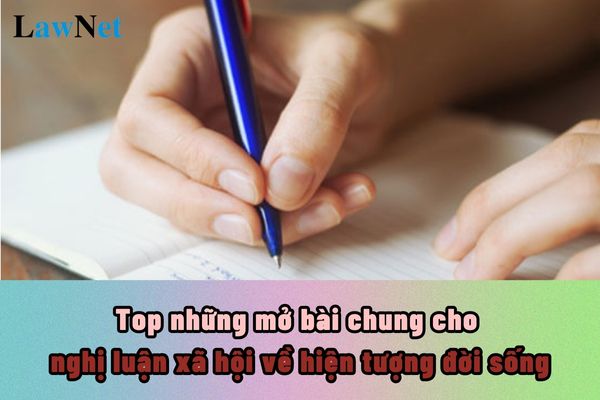Vietnam: What are the top sample brief introductions of a social argumentative essay on a phenomenon in life? What are the rights of lower secondary school students?
What are the top sample brief introductions of a social argumentative essay on a phenomenon in life in Vietnam?
The introduction of a social argumentative essay on a phenomenon in life in Vietnam is content that students will practice in the writing section of the Literature program.
|
Top sample brief introductions of a social argumentative essay on phenomena in life General Introduction: |
*Note: The information on top sample brief introductions of a social argumentative essay on phenomena in life in Vietnam is for reference only./.

What are the top sample brief introductions of a social argumentative essay on a phenomenon in life in Vietnam? What are the rights of lower secondary school students? (Image from the Internet)
In Vietnam, what is the grade whose Literature program includes writing general introductions of a social argumentative essay?
Based on Section 5 of the General Education Program for the Literature course issued with Circular 32/2018/TT-BGDDT, the requirements for reading comprehension in literature for grade 6 are specified. To be specific:
VIETNAMESE LANGUAGE KNOWLEDGE
1.1. Simple and compound words, compound and repetitive words
1.2. Words with multiple meanings and homonyms
1.3. Meaning of certain common idioms
1.4. Meaning of some common Sino-Vietnamese elements (e.g., bat, phi) and the meaning of words containing those Sino-Vietnamese elements (e.g., bat cong, bat dong, phi nghia, phi li)
2.1. Main components of a sentence: expanding the main components with phrases
2.2. Adverbials: characteristics and function in linking sentences)
2.3. The use of semicolons (to mark boundaries in a complex list); quotation marks (to indicate an atypical meaning)
3.1. Rhetorical devices of metaphor and metonymy: characteristics and effects
3.2. Paragraphs and texts: characteristics and function
3.3. Choosing words and sentence structures suitable for expressing the meaning of the text
3.4. Text types and genres
- Narrative text: writing about a personal experience, recounting a folk tale
- Descriptive text: describing an activity scene
- Expressive text: lục bát poetry; a paragraph recording feelings when reading lục bát poetry
- Argumentative text: opinions, reasons, evidence; presenting an opinion about a phenomenon in study and life
- Informational text: headlines, subheadings, headings, bold letters, numbers, and bullet points; texts explaining an event; records of a case or meeting, discussion
4.1. Language development: borrowing phenomena, borrowed words, use of borrowed words
4.2. Non-verbal communication tools: images, data
LITERATURE KNOWLEDGE
1.1. Expressive qualities of literary texts
1.2. Details and connections between details in literary texts
1.3. Topics, themes of texts; feelings, emotions of the writer
2.1. Elements: plot, character, narrator's voice, and character's voice in legends, fairy tales, fables
2.2. First-person and third-person narrators
2.3. Formal elements of lục bát poetry: number of syllables, number of lines, rhyme, rhythm
2.4. Title, line of verse, stanza, rhyme, rhythm, words, and the effect of those elements in a poem
2.5. Narrative and descriptive elements in poetry
2.6. Diary writing, recounting events, first-person narration in memoirs or travelogues
CORPUS
1.1. Literary works
- Legends, fairy tales, fables, short stories
- Poetry, lục bát poetry
- Memoirs or travelogues
1.2. Argumentative texts
- Social commentary
- Literary commentary
1.3. Informational texts
- Narrating events
- Records
- Summary diagrams
2. Suggested text selections: see suggestion lists
Thus, the practice of writing general introductions of a social argumentative essay will be included in the 6th-grade Literature program.
What are the rights of lower secondary school students in Vietnam?
According to Article 35 of the Regulations on lower secondary schools, upper secondary schools, and multi-level schools issued by the Ministry of Education and Training with Circular 32/2020/TT-BGDDT, lower secondary school students in Vietnam have several rights:
1. Receive comprehensive education with fairness, be provided with time, facilities, hygiene and safety to learn in class and self-learn at home, be informed of their education and training, and be able to use learning, cultural and sport equipment of their schools as per the law.
2. Receive respect, protection and fair and democratic treatment, complain to their schools and education authorities about decisions concerning themselves; transfer school with legitimate reason as per existing regulations; enter school before the compulsory starting age, skip a grade and study at an age higher than the compulsory attendance age according to regulations in Article 33 of Circular 32/2020/TT-BGDDT.
3. Participate in activities for development of their gifts in academic subjects, sports and art organized by their schools if able to.
4. Students eligible for social benefits, disadvantaged students and gifted students may receive sponsorship or other benefits as per the law.
5. Transfer school if eligible according to regulations following school transfer procedures stipulated by the Minister of Education and Training.
6. Enjoy other rights as per the law.

